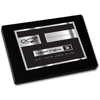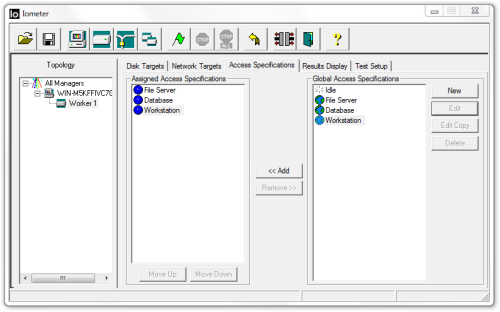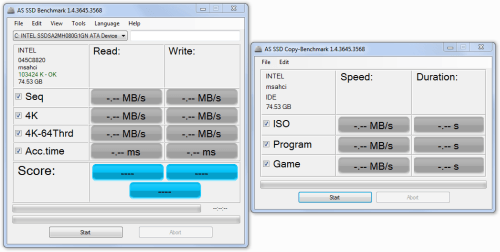- Qualcomm Launches Snapdragon 4 Gen 2 Mobile Platform
- AMD Launches Ryzen PRO 7000 Series Mobile & Desktop Platform
- Intel Launches Sleek Single-Slot Arc Pro A60 Workstation Graphics Card
- NVIDIA Announces Latest Ada Lovelace Additions: GeForce RTX 4060 Ti & RTX 4060
- Maxon Redshift With AMD Radeon GPU Rendering Support Now Available
OCZ Vertex 3 240GB SATA 6Gbit/s SSD Review

OCZ’s Vertex series of SSDs have earned the reputation as being some of the best, by offering excellent throughput and random 4KB IOPS performance. Vertex 3 takes things to an entirely new level, in some cases doubling the performance of its predecessor, and gives us an uncompromising balance across any performance metric you care to throw at it.
Page 4 – Synthetic: Iometer & AS SSD
Originally developed by Intel, and since given to the open-source community, Iometer (pronounced “eyeawmeter”, like thermometer) is one of the best storage-testing applications available, for a couple of reasons. The first, and primary, is that it’s completely customizable, and if you have a specific workload you need to hit a drive with, you can easily accomplish it here. Also, the program delivers results in IOPS (input/output operations per second), a common metric used in enterprise and server environments.
The level of customization cannot be understated. Aside from choosing the obvious figures, like chunk sizes, you can choose the percentage of the time that each respective chunk size will be used in a given test. You can also alter the percentages for read and write, and also how often either the reads or writes will be random (as opposed to sequential). I’m just touching the surface here, but what’s most important is that we’re able to deliver a consistent test on all of our drives, which increases the accuracy in our results.
Because of the level of control Iometer offers, we’ve created profiles for three of the most popular workloads out there: Database, File Server and Workstation. Database uses chunk sizes of 8KB, with 67% read, along with 100% random coverage. File Server is the more robust of the group, as it features chunk sizes ranging from 512B to 64KB, in varying levels of access, but again with 100% random coverage. Lastly, Workstation focuses on 8KB chunks with 80% read and 80% random coverage.
Because these profiles aren’t easily found on the Web, with the same being said about the exact structure of each, we’re hosting the software here for those who want to benchmark their own drives with the exact same profiles we use. That ZIP archive (~3.5MB) includes the application and the three profiles in an .icf file.



Not much can be said here. Small random file writes of 512B to 4KB are stressful for even an SSD designed to handle them, and Iometer is a particularly brutal test for consumer SSDs in general. Even so the Vertex 3 completely dominates the V2 here. Performance like this is literally unheard of for these types of small file access patterns in these tests. Even trying to compare the Vertex 3’s results to a typical hard drive is just futile here.
AS SSD
As the name hints, AS SSD is a nifty little program written exclusively for solid-state drives. It can be run on a mechanical hard drive, but be warned what takes a few minutes will require the better part of an hour to complete! This handy tool measures sequential reads and writes in addition to the important 4KB random reads and writes, then ranks the results with a final score for quick comparisons with other SSDs.
In addition to the main test there is a secondary benchmark that simulates the type of data transferred for ISO, Program, and Game files. With version 1.6 a compression benchmark was also added although not utilized here. We selected this program for its precision, ability to generate large file sizes on the fly, and that it is written to bypass Windows 7’s automatic caching system. The tool does not bypass any onboard cache.





The SATA 6Gb/s interface allows the Vertex 3 room to stretch its legs. When it comes to read requests SSDs have been bottlenecked by the SATA 3Gb/s interface for some time. The interface isn’t responsible for the 4KB and 4K-Thrd scores, however; these are purely due to the controller.
4K-Thrd is similar to the 4K test but spawns multiple requests; basically this tests how good the SSD is at handling multiple file actions at once. Some older SSDs and even current budget SSDs such as the Toshiba controller in the V+ drive are only capable of processing a single data request at a time (known as a queue depth, or QD 1). Obviously the Vertex 2’s SF-1200 could multitask, but its successor takes it up another level entirely. The Vertex 3 simply cleans house with this SSD benchmarking program.
Support our efforts! With ad revenue at an all-time low for written websites, we're relying more than ever on reader support to help us continue putting so much effort into this type of content. You can support us by becoming a Patron, or by using our Amazon shopping affiliate links listed through our articles. Thanks for your support!






